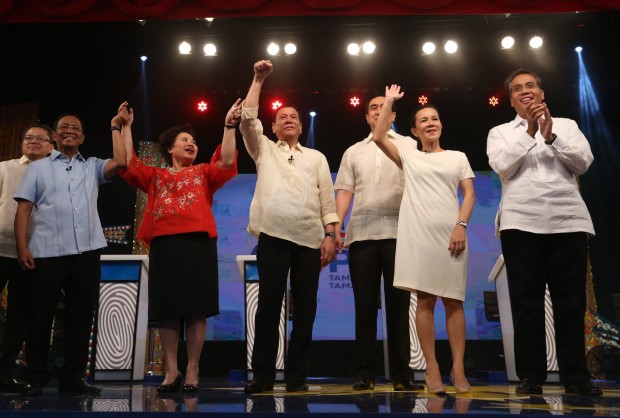
Presidential debates held in Capitol University in Cagayan de Oro City with VP Jejomar Binay, Sen. Miriam Santiago, Mayor Rodrigo Duterte, Sen. Grace Poe and Mar Roxas. Also in photo is COMELEC Chairman Andy Bautista. INQUIRER PHOTO/LYN RILLON
All of them won the debate.
A day after the first presidential debate held in Cagayan de Oro City, the camps of Vice President Jejomar Binay, Sen. Miriam Defensor-Santiago, Davao City Mayor Rodrigo Duterte, Sen. Grace Poe and former Interior Secretary Mar Roxas claimed first-round victory.
But Dignidad, a coalition of civil society groups organized recently, was not impressed with the debate and the performance of the candidates.
The group found the questions and the candidates’ answers inadequate and the face-off’s format faulty.
Navotas Rep. Tobias Tiangco, president of Binay’s United Nationalist Alliance, said the Vice President’s team was satisfied that he showed he was “the most experienced, most ready and most committed to uplift the lives of the poor.”
Malacañang hailed Santiago’s performance, with Presidential Communications Undersecretary Manuel Quezon III saying “many people’s hearts were melted by the great personal courage shown by Senator Santiago in what was a very obvious great physical ordeal for her.”
“Duterte wins first presidential debate,” Duterte’s camp declared in a press release.
“It is clear that the big winner of the debate is Mayor Duterte and the big loser is Vice President Jejomar Binay,” said the press release.
Duterte’s running mate, Sen. Peter Cayetano, agreed. “Binay is the biggest loser in the debate. He lied about the source of his wealth and could not talk about corruption, unlike the other candidates,” Cayetano said at a campaign rally in Pateros Monday.
‘Enriching experience’
In a statement, Poe said she found the debate “an enriching experience.”
“You get the pulse of the people. Seeing that kind of ardor for knowing who would become the next President has only spurred me on to reach out and go to the farthest, hardest-to-reach places in the country so I can hear and address the concerns of the people,” she said.
Malacañang said Roxas was the “best prepared” speaker at the debate.
“Secretary Roxas showed that he was the best prepared, that he was able to meet the timelines, which is important because it boiled down complex questions into answers that met the timeline. And I think people saw a new side of him that they may not have known in the past—a side of great responsibility and great commitment,” Quezon said in a tweet.
Roxas’ running mate, Rep. Leni Robredo, said Roxas stood out from the pack and projected an image of confidence, clarity of thought and sincerity.
Marikina Rep. Romero Quimbo, spokesperson for the Liberal Party-led administration coalition, praised Roxas for being straightforward and directly engaging and criticizing his opponents—something the other candidates seemed reluctant to do.
‘Good start’
Commission on Elections (Comelec) Chair Andres Bautista found the candidates “very civil.” He said he expected them to be more aggressive in the succeeding debates.
Sunday’s face-off was the first in a series of three organized by the Comelec, GMA 7 and the Philippine Daily Inquirer to shift the public’s focus toward policy talk and programs to confront social life.
“It was a good start, given that we haven’t done it [in 24 years]. At least we are able to show that it can be done,” Bautista told reporters Monday.
He observed that the five candidates were “too formal.”
But, as in boxing, he said, the candidates were “just feeling each other out.”
“In succeeding debates, perhaps they will be more aggressive,” he said.
Bautista said the “restrictive and structured” atmosphere during the debate could have been the result of its dual-moderator format.
He said the Comelec might look into the possibility of improving the conduct of the debate to allow the candidates to be more tough in their rebuttals.
Visual aids may also add a bit of spice to the exchanges in the succeeding debates, he said.
“You cannot have a boring sermon. You have to use graphics and pictures. [We have to think about] what we can do to make the debate more interesting and fair to the candidates,” he said.
Bautista said the Comelec would also look for ways to give the candidates more time to speak. He noted observations from the public that there were too many ads aired during the debate.
‘State-driven’ programs
Dignidad—composed of multisectoral cause-oriented groups such as Akbayan, Freedom from Debt Coalition (FDC), Partido ng Manggagawa and Sanlakas, among other organizations—has been pushing for “state-driven” programs on decent livelihood, affordable housing, free quality healthcare, food security, reliable public transport, free education up to the tertiary level, and pensions for senior citizens, and subsidies for children, people with disabilities and calamity victims.
These were “key social issues” lacking in the debate, noted former Akbayan Rep. Walden Bello, now a senatorial candidate.
For Dignidad convener Rene Ofreneo, former dean of the University of the Philippines School of Labor and Industrial Relations, the candidates should be asked about their plans to “overhaul the …unequal, exclusivist, unsustainable economic order, which prevents the government from providing basic rights to Filipinos as stated in the Constitution.” With reports from Nancy C. Carvajal, DJ Yap, Jaymee T. Gamil and AP